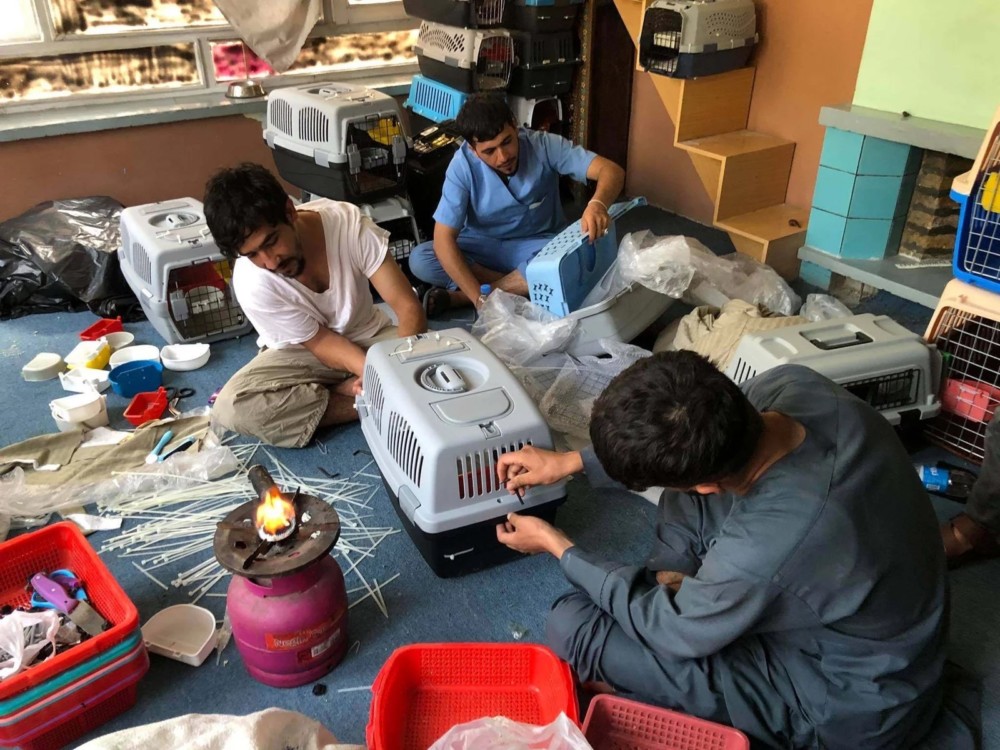
During the chaotic events of the U.S. withdrawal from Afghanistan, the U.S. military made the disturbing decision to leave behind 150 dogs who were waiting in crates at the Kabul airport. The dogs were supposed to board a plane that had been chartered by Kabul Small Animal Rescue (KSAR) to evacuate them from the country. These animals, who were all under the care of KSAR, included 50 contract working dogs in addition to companion animals of evacuees who were not permitted to take their animals with them. According to SPCA International, the private plane was not granted airport access, leaving the dogs in a tenuous situation. But rather than allowing the dogs on military planes, the U.S. military instead released them from their crates into a contained area of the airport, where they were left to fend for themselves. The American founder of KSAR, Charlotte Maxwell-Jones, was forced to leave the airport and remains dedicated to recovering the dogs, as well as locating and rescuing other contract working dogs who were abandoned.
Images circulating on social media claiming that the U.S. had left military working dogs behind inflamed emotions around the issue as misinformation ran rampant over the internet. The Department of Defense pushed back against the accusation, stating that no military working dogs were left behind. In a written response to People for the Ethical Treatment of Animals, an Army representative maintained that the dogs were not permitted on military flights due to unspecified “regulations.” The Army also misrepresented the dogs as “stray Afghan dogs” when they were, in fact, contract working dogs and companion animals, including puppies, who were likely more used to napping on beds than desperately scrounging for food and water.

Daphna Nachminovitch, senior vice president at PETA, revealed in a recent interview that, according to the White House, 26 military flights carrying 1200 people left Kabul during the troop withdrawal. Many of these flights were not full and could have easily accommodated 150 dogs. “The ability to move these dogs out of harm’s way was there, and the wrong choice was made,” she said.
The Department of Defense was careful to state that no military dogs were left behind, but contract working dogs, who “belong” to companies working with, and being paid by, the U.S. government, do many of the same jobs as military working dogs. Like military working dogs, they face harrowing, life-threatening situations while performing highly skilled tasks. These dogs protected and supported the U.S. troops and their allies who were stationed in Afghanistan. They deserve better than for the Department of Defense to simply abdicate responsibility for them after benefitting from their skills. Similarly, the companion animals of U.S. military members, contractors, and other workers provided important emotional support in the difficult and stressful conditions of deployment. Leaving these trusted family members behind in uncertain and hazardous situations is simply unacceptable. The military’s decision to turn its back on the dogs, when they had the means and capacity to evacuate them, indicates a disturbing lack of compassion and accountability.
While the ownership issue allows the U.S. government to deny responsibility for the dogs left behind, Nachminovitch points out that ultimately, legal technicalities shouldn’t have mattered in this perilous situation. “It does not matter who owns the dog,” she says, “The dog is in as much danger regardless of whether they were a stray, working dog, or companion animal. To them, getting out of Afghanistan is a matter of life or death.” Since being abandoned on August 31, at least several of the released dogs have died as KSAR fights to rescue the remaining dogs.
To support KSAR’s efforts, please consider donating to their GoFundMe campaign.
You may also urge the United States Department of Defense and State Department to bring these dogs to safety, by signing the petition by In Defense of Animals.
Ingrid L. Taylor is a writer, poet, and veterinarian whose work explores strategies for fostering multispecies solidarity and deconstructing speciesism. She has worked in clinical veterinary medicine and public health. She is a U.S. military veteran who provided medical care for working dogs. Find her at ingridltaylor.com or on Instagram @tildybear.


I would love to have one of the dogs.
hello world – As a person rescuer myself it angers me to have the ksar stranded without USA government lift to save Charlotte. We want to help and can only pray she and all are let go onto a flight. Might an army of angels do this work today for the Kingdom of God -peace